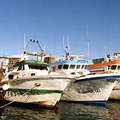 在地中海水域擁有釣魚船隊的國家皆同意一系列保護該區魚群減少的新措施。對於世界鮪魚群因非法、未被揭發且毫無紀律的捕釣下漸漸走向滅絕,代表團將採行更嚴格的新鮪魚捕釣規則。
在地中海水域擁有釣魚船隊的國家皆同意一系列保護該區魚群減少的新措施。對於世界鮪魚群因非法、未被揭發且毫無紀律的捕釣下漸漸走向滅絕,代表團將採行更嚴格的新鮪魚捕釣規則。
聯合國糧農組織下的地中海一般漁業委員會(GFCM)上禮拜在羅馬舉行年度會議,當中19個國家及歐洲共同體均出席與會,並在會議中採行上述措施。該會議的一個重要成果即是通過一項協定:在拖網漁業上使用新的、有更多選擇性的網釣方式。這些針對魚網形狀的改變,將使幼小的魚隻能夠逃過捕捉,重回海洋繼續成長(讀者修正註)。
該委員會也同意一套共同的標準,以測量該區漁業船隊的能力,並評估他們對魚群存量的衝擊,而這是第一次在地中海成立的聯合系統。
Nations whose fishing fleets work the waters of the Mediterranean Sea have agreed on a series of new measures aimed at conserving the region's dwindling fish populations. The delegates also adopted new, stricter rules for tuna fishing in the face of warnings that illegal, unreported and unregulated fishing is wiping out the world's tunas.
The measures were adopted during the annual meeting of the UN Food and Agriculture Organization's General Fisheries Commission for the Mediterranean, GFCM. Held last week in Rome, the meeting was attended by 19 countries plus the European Community. One of the meeting's main outcomes was an agreement on the use of new, more selective types of netting in bottom trawls. Changes to the shape of the mesh holes will allow small juvenile fish that have not yet reproduced to escape capture and return to the wild to breed.
The commission also agreed on a common set of benchmarks for measuring the capacity of fishing fleets in the region and assessing their impacts on shared fish stocks, the first time such a unified system has existed in the Mediterranean.




